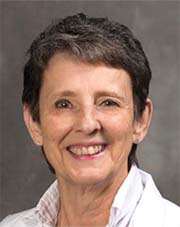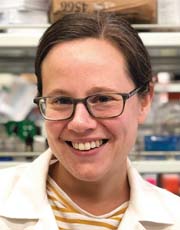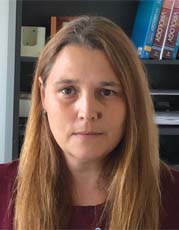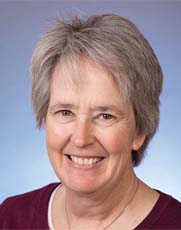Chasing Truth For A Stronger Future
At Saint Louis University, Scientists of all Disciplines Investigate the Most Complex Research Questions in the Pursuit Of Truth. Meet the Women United Under a Shared Quest for Deeper Understanding — and Learn More About Their Groundbreaking Research, Insights and Challenges.
Making Connections Through Innovative Ideas

Dr. Barbara Whitman’s 40-year-long career can be described in a few phrases: Find your passion, act on it, and use your voice. As professor of pediatrics and assistant dean of graduate medical education, Dr. Whitman started her career in family therapy and psychiatric epidemiology. But when she met a woman with a child who had Prader-Willi syndrome, the trajectory of her career changed forever.
From that moment, Dr. Whitman devoted much of her research to studying Prader-Willi, an extremely rare syndrome which causes the affected individual to never feel full.
“They literally can eat themselves to death in the sense they can weigh 500–600 pounds if not properly cared for and with limited access to food,” Dr. Whitman says.
The syndrome is immensely difficult on families as well: “It’s making sure the fridges are locked, there’s no food out, there’s no upsetting the child who literally wants to eat all the time. It changes the dynamics of a family.”
Alongside her own research, Dr. Whitman serves as an assistant dean and is responsible for organizing faculty development programs. Soon, she hopes to initiate programming around gaming as a tool for medical teaching.
“The gaming industry is flourishing,” Dr. Whitman shares. “It highlighted the gap between our faculty and our trainees and their ability to communicate with and embrace the digital world.”
As she witnessed students armed with a sophisticated digital knowledge, Dr. Whitman felt inspired to investigate a new initiative — reverse mentorship — a program that pairs senior leaders with younger scientists. Although the program is still in its early phases, Dr. Whitman is excited about the possibility of teamwork and collaboration between faculty and students in the coming years.
Dr. Whitman also keeps her doors open for any student in need of answers or support as they navigate the complexities of a career in science.
“Medicine is a narrow world,” she says. “If you partner with another medical person, you’re remaining in a very narrow world. You need to broaden your outside life more. You need to have hobbies. You need to have an outlet for your creativity, which you won’t often have in your medical job.”
As she reflects on her 40 years in medicine, Dr. Whitmanbrings a broad perspective on how the industry has changed—particularly for women.
“I do think things are better. They’ve markedly improved in terms of understanding that the intellectual and clinical contributions of women are no different from men,” she says. “I have been privileged to work here at SLU. The university and the medical school have allowed me to have an absolutely wonderful career that I would wish for everybody here.”
Honoring Her Ancestors Through Her Research
Adriana Montaño, Ph.D., and interim senior associate dean for research in the School of Medicine, has spent the entirety of her career studying orphan diseases—a group of disorders that impact fewer than 200,000 individuals. But for Dr. Montaño, it’s more than just research—her work on Morquio A syndrome, a rare inherited birth defect that impacts a child’s appearance, organ function, and physical abilities, is personal due to its prevalence in her home country of Colombia.
“It’s the largest hub of patients,” Dr. Montaño explains. “Our ancestors and the indigenous people also had the disease. We can see portrayals of it in ceramics and stone carvings.”
After learning about Morquio A syndrome as an undergraduate at the University of Los Andes in Bogotá, Dr. Montaño pursued her Ph.D. in Japan.
“At that time, the only place in the world doing research on Morquio A was that specific lab,” she says. “I did a Ph.D. in Medical Sciences with a focus on biochemistry and molecular biology. I learned about clinical features, metabolites, and mutations related to this disease.”
Now 25 years later, Dr. Montaño has been an integral part of the SLU research efforts investigating mucopolysaccharidoses (MPS), a group of genetic lysosomal storage diseases that includes Morquio A syndrome.
“We focus on the basic science—trying to understand what this disease is and trying to find biomarkers,” she says. “We do clinical studies to understand what happens in patients.”
In the early stages of her career as a young scientist, Dr. Montaño found herself without a mentor—and as an established researcher, she hopes to provide solace and support to the women and students in her lab.
“I’m trying not to let history repeat itself,” she says. “I think mentorship at any level is very important. We all need mentors in our lives.”
Dr. Montaño has also been a part of the Women in Medicine and Science Association at SLU.
“I think that program has provided the chance to interact with more women,” she says. “We all go through similar things—we have families and careers, and dreams and difficulties. It’s nice to know that you’re not alone in the journey.”
As a researcher studying a rare disease, Dr. Montaño has carved a unique path for her career—and as she looks back on over two decades of research, she offers prudent advice to those interested in pursuing a similar role.
“Just move forward,” she says. “Don’t let the obstacles stop you. You must learn from the difficulties. As women, we often underestimate ourselves—and people think that we are ‘less than.’ Appreciate yourself, value yourself, and value your knowledge.”
To learn more about Morquio A syndrome and other genetic lysosomal storage diseases, visit mpssociety.org.
Inspired By the Stars
As a college senior, Elise Alspach, Ph.D., an assistant professor in the Department of Molecular Microbiology and Immunology, got her first tattoo: the Little Dipper.
“When I was young looking up at the stars, I remember that first sense of awe at the universe,” Dr. Alspach says. “I got the tattoo to remind me of that feeling—when you’re looking at something you don’t understand and want to know more about it.”

Propelled by this quest for knowledge, Dr. Alspach obtained her B.S. in Cell and Molecular
Biology from Bradley University and her Ph.D. in Biology and Biomedical Sciences from
Washington University in St. Louis. She joined SLU in May 2020 where her research
focuses on cancer immunotherapies. “We’re interested in looking at how the immune
system interacts with tumors and can be harnessed as a therapeutic for cancer,” says
Dr. Alspach. One therapy in particular is immune checkpoint therapy—a treatment that
“sets off an alarm clock in a tumor,” making the immune system aware of the presence
of the tumor and start to fight it. While immunotherapies can be life-changing for
many patients, there is still work to be done in expanding the success rate: “Only
about 20–40 percent of cancer patients have really good responses to immunotherapies,”
Dr. Alspach says. “I’m looking for ways to improve those therapies.”
Dr. Alspach and her team are also researching the distinction in immune response against tumors in males and females, a topic that is largely unexplored.
“My lab is interested in looking at the differences in antitumor immune responses, and how that influences eventual tumor development and evolution. We’re doing a lot of modeling of that in mice, and then hopefully moving into patient samples,” she says.
As principal investigator in her lab, Dr. Alspach looks back at her journey and remembers one significant mentor: Dr. Sheila Stewart.
“When I was a graduate student, Dr. Stewart’s goal was to help us develop our voices,” says Dr. Alspach. “She was passionate about making her female students into leaders.”
Today, Dr. Alspach hopes to provide her female trainees with opportunities for mentorship—while simultaneously contributing to cancer research with the hope of making a difference for future generations.
“In a very personal sense, I am motivated to try and do something to make sure that the experiences I had with my mom don’t happen to as many people in the future,” she says. “I see myself giving back to humanity through my work. All I want to do is help people have better lives."
Responding to Global Crisis
Amelia Pinto, Ph.D., a viral immunologist and assistant professor in microbiology and immunology, has spent nearly two decades studying emerging infectious diseases—so when the COVID-19 pandemic struck, she jumped in without question, knowing that her work is often dictated by global crises.
“When you study emerging infectious disease, you have to be comfortable with being flexible as far as what you’re going to study,” she shares.

After joining SLU in 2018, Dr. Pinto began research on Zika virus in addition to a quick project on SARS.
“We set up a lot of systems in the lab in our work with SARS then,” she recalls. “Honestly, I was not thinking even remotely about going back to SARS up until the COVID-19 pandemic. But with my background in emerging infectious diseases, I knew how to adapt quickly, how to publish quickly, and where the impactful work was in what I do.”
For Dr. Pinto, her work is centered on the immune system response to infectious disease with the goal of improving vaccine efficacy. In addition to her work with SARS-CoV-2, she is also involved in researching two viruses relevant to the health of the greater Missouri community: the Powassan virus and the Heartland virus.
“Missouri is an odd epicenter of tick-borne viruses,” Dr. Pinto says. “Global warming is bringing the tick populations in much, much larger numbers—and in greater contact with people. We’re seeing pathogens that would have been called an unknown illness now being spread everywhere.”
Although the infection rate of these two viruses is still low, Dr. Pinto’s lab is devoted to learning what type of vaccine would be effective in the future.
“The grand vision would be a screening of animal populations in an area, identifying the virus in that area, and then preventatively vaccinating an area of people where the virus was identified,” she says.
Despite the unpredictable twists and turns of studying emergent diseases, what surprises Dr. Pinto the most isn’t the ever-changing nature of her field—it’s her unexpected love of teaching.
“The way Ph.D. researchers are trained, you’re very selfish to your project because that’s how you keep going—you focus on your work and you work alone,” she says. “But it’s a very myopic vision of how you’re going to be successful. The biggest surprise of my career has been how much I love teaching and my students.”
Dr. Pinto also hopes to provide meaningful mentorship to her students—especially female scientists who may feel alone.
“My graduate advisor was female and I think that made a huge difference,” she says. “You’re not always alone or blazing a trail—there are other people who’ve had these same issues who have been successful, and managed to navigate a way through and still hold on to the beliefs they have.” Dr. Pinto also imparts empowering advice to all of her students: “There’s this fear that you must be perfect in order to make it—but you have to be brave, take risks, and ask good questions. It’s okay to fail.”
Early to the Intersection of Science and Technology
Maureen Donlin, Ph.D., is no stranger to charting her own path through unfamiliar territory. With early training in biochemistry and enzyme kinetics, Dr. Donlin discovered a passion for data-driven computational work in the mid-1990s—and subsequently carved her own career at Saint Louis University based on her intersecting interests.

When Dr. Donlin and her husband first moved to St. Louis in 1994, Dr. Donlin accepted a job in curriculum development at Washington University in St. Louis—and was first introduced to the emerging world of technology and computers.
“I had done nothing in the computational realm at all,” she recalls. “But when I got there, they said, ‘Oh, let’s introduce the use of computers and do some online tutorials.”
Dr. Donlin jumped in without hesitation.
“I taught myself and I took some coursework—like HTML programming, database programming, and learning how to do things on the web,” she says. After her role with Washington University in St. Louis, Dr. Donlin took a position at SLU in the School of Public Health that focused heavily on the connection between programming and healthcare, a new angle that resonated with her background.
“I ended up learning how to do database programming and creating database-driven websites,” she says.
Within three years, Dr. William Sly, the chair of biochemistry at SLU, approached Dr. Donlin about a potential bioinformatics job at SLU—and ever since 2001, she’s been a vital part of the biochemistry and molecular biology department, running a small research lab where she studies the fungal pathogen, Cryptococcus neoformans. An environmental pathogen, scientists started seeing it clinically in the 1970s after they began treating cancer patients with immunosuppressive drugs.
“It would grow in the lungs,” says Dr. Donlin, “But it can disseminate to the brain and that’s the problem because it is very difficult to treat.” Her lab’s research is focused on finding new compounds and chemicals that have the potential to create new therapies since current options are only 15–30 percent effective.
In addition to her own research, Dr. Donlin directs the SLU master’s program in bioinformatics and computational biology, where she helps oversee recruitment, internships, and equity in the department and beyond.
“Even at the graduate level, there’s an underrepresentation of women in computational fields,” she says. “I hope we can recruit more women into that. We’re actually doing pretty well—I think we’re close to 50-50 in our graduating class.”
As Dr. Donlin spends time supporting young women in bioinformatics and computational biology, she’s mindful of a challenge that many women in science face systemically: “Balancing your professional goals with the expectation of women being the primary caregiver—whether it’s to a child or a parent or someone else,” she says. “Most of us were raised to think more about caring for others first before taking care of our needs. But SLU offered me the freedom to really find my own path. I’ve been encouraged and supported in so many ways.”
